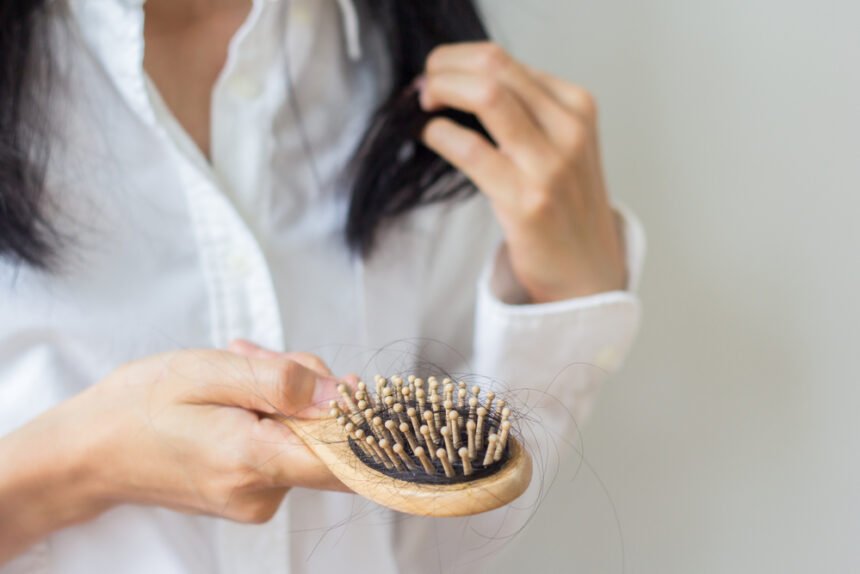Hair loss does not only affect the scalp but the entire body. The reason for hair loss may be hormonal, hereditary or result from medications and medical conditions. While some people do not really seem to be bothered by their hair loss and just let it go untreated and unhidden, others choose to cover it up using different hairstyles, scarves, and hats. There are, also, other people who choose to pursue hair loss treatment methods to prevent further loss and restore growth.
Unfortunately, treating hair loss is difficult, since there are many different causes. Pulling on your hair can be a common cause. Traction Alopecia from wearing a wig is a less common issue, but one that affects people that wear wigs for various reasons while still having hair.
Due to the different cause of hair loss, it may manifest itself in different ways. For example, it can happen suddenly or gradually; it may also be temporary or permanent.
What are the symptoms?
- Gradual thinning of hair on top of the head; this is the most common symptom and it affects both men and women
- Sudden loosening of hair; this may be as a result of either physical or emotional stress. You will notice relatively large amounts of hair falling off when you comb or wash your hair.
- Circular or patchy bald spots; these are smooth bald spots that can be found on the scalp (coin-sized), eyebrows, or beards.
Before the hair falls out, you might experience some itching
- Full body hair loss; this may result from some medical conditions or treatments such as chemotherapy.
After the treatment stops, there’s hair regrowth.
- Patches of scaling on the scalp; these are as a result of ringworms.
Risk factors
The factors that increase one’s risk of hair loss are:
- Age
- Stress
- Family genetics
- Significant weight gain or loss
- Medical conditions such as lupus and diabetes
Types of Hair Loss
Hair loss is also called alopecia. The different types of hair loss include:
- Involutional Alopecia. The hair gradually thins as one ages becoming shorter and fewer in number
- Androgenic Alopecia. This results in male and female baldness patterns which are characterized by receding hairline in men and hair thinning in women.
- Alopecia Areata. This condition causes patches in children and young adults and results in sudden hair loss. The baldness may be permanent or temporary.
- Alopecia Universalis. This condition causes all body hair (including pubic hair, eyebrows, and eyelashes) to fall out.
- Telogen Effluvium. Hair shedding occurring as a result of changes in the growth cycle of hair which causes subsequent thinning
- Scarring Alopecias. Permanent hair loss resulting from inflammatory skin conditions and other skin disorders
Causes
Factors that influence hair loss are:
- Hormones
- Genes
- Stress
- Diet
- Childbirth
- Illness and other medical conditions
- X-rays
- Medication
- Burns and injuries
- Cosmetic procedures
- Cosmetic Procedures
- Autoimmune diseases
- Certain hairstyles
Prevention
Seeing more hair strands in your brush should cause you to worry. However, research has shown that it’s quite possible to thicken hair back by protecting your hair from damage that leads to thinning. We compiled a list of ways that may help you prevent hair loss.
- Make some dietary changes. There are some foods that are known to be rich in hair-growth nutrients; they include salmon, honey, nuts and seeds, spinach, oysters, pumpkin, seaweed and rosemary.
- Avoid harsh hairstyles and treatments. Always choose your products wisely depending on your hair type.
- Treat your hair often and if possible, go natural. Leaving your hair in its natural color and texture gives it time to recover from any harsh treatments.
- Avoid medications that are associated with hair loss. Certain medications and treatments such as chemotherapy are associated with rapid hair fall. Medicine such as diet pills, cholesterol medicines, birth control pills, and non-steroidal anti-inflammatory drugs often damage your hair follicles and might result in extreme hair loss.
- Stop smoking. Smoking does not help to promote healthy hair growth. In fact, it does the exact opposite. The health risks associated with smoking are undisputed. The science behind this is tied to how the blood circulates and how the liver functions. Research has shown that hair follicles require adequate circulation of blood for effective hair growth. Proper circulation supplies the hair with all the necessary nutrients that are necessary for hair growth.









